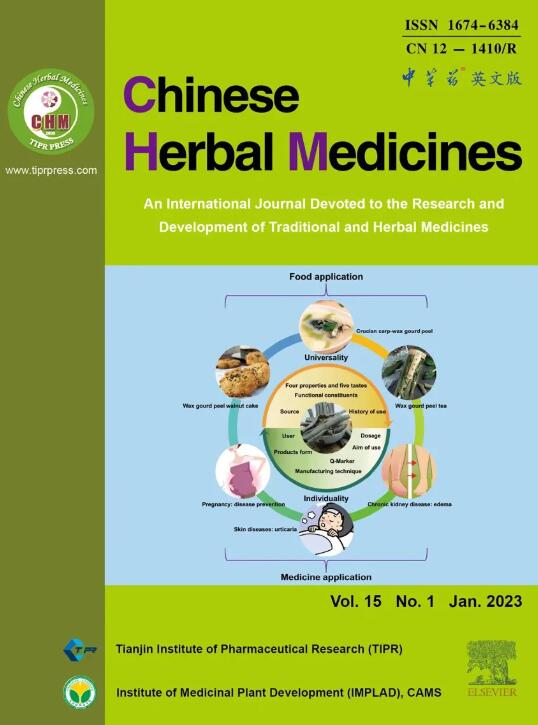Sini decoction alleviates inflammation injury after myocardial infarction through regulating arachidonic acid metabolism
IF 8.9
4区 医学
Q1 CHEMISTRY, MEDICINAL
引用次数: 0
Abstract
Objective
Myocardial inflammation during myocardial infarction (MI) could be inhibited by regulating arachidonic acid (AA) metabolism. Recent studies demonstrated that Sini Decoction (SND) was identified to be an effective prescription for treating heart failure (HF) caused by MI. But the anti-inflammatory mechanism of SND remained unclear. The work was designed to investigate the anti-inflammatory mechanism of SND through the AA metabolism pathway in vitro and in vivo experiments.
Methods
An inflammatory injury model of H9c2 cells was established by lipopolysaccharide (LPS)-stimulated macrophage-conditioned medium (CM). The MI model was built by the ligation of left anterior descending (LAD) branch of coronary artery in rat. Meanwhile, the rats were divided into five groups: sham group, MI group, MI + Celecoxib group, MI + low-dose SND group (SND-L) and MI + high-dose SND group (SND-H). Cardiac function, histopathological changes and serum cytokines were examined four weeks later. Western blot analysis was conducted to verify the key enzymes levels in the AA metabolic pathway, including phospholipase A2 (PLA2), cyclooxygenases (COXs) and lipoxygenases (LOXs).
Results
These in vivo results demonstrated that SND could improve the cardiac function and pathological changes of rats with MI, and regulate the key inflammatory molecules in the AA metabolism pathway, including sPLA2, COX-1, COX-2, 5-LOX and 15-LOX. In vitro, SND could decrease the release of pro-inflammatory cytokines including TNF-α and IL-6 and inhibit cell apoptosis in CM-induced H9c2 cells. Moreover, SND could protect H9c2 cells from the damage of CM by regulating nuclear factor kappa-B (NF-κB) signal pathway and the expression of COX-2.
Conclusion
SND may be a drug candidate for anti-inflammatory treatment during MI by regulating the multiple targets in the AA metabolism pathway.
西尼煎膏通过调节花生四烯酸代谢减轻心肌梗死后的炎症损伤
目的通过调节花生四烯酸(AA)代谢抑制心肌梗死(MI)时的心肌炎症反应。近年来研究证实四逆汤是治疗心肌梗死所致心力衰竭的有效方药,但其抗炎机制尚不清楚。本工作旨在通过体外和体内实验探讨SND的抗炎机制。方法采用脂多糖(LPS)刺激的巨噬细胞条件培养基(CM)建立H9c2细胞炎症损伤模型。采用冠状动脉左前降支结扎法建立心肌梗死模型。同时将大鼠分为5组:假手术组、心肌梗死组、心肌梗死+塞来昔布组、心肌梗死+低剂量SND组(SND- l)和心肌梗死+高剂量SND组(SND- h)。4周后检测心功能、组织病理变化及血清细胞因子。Western blot分析验证了AA代谢途径中的关键酶水平,包括磷脂酶A2 (PLA2)、环氧化酶(cox)和脂氧化酶(LOXs)。结果体内实验结果表明,SND可改善心肌梗死大鼠的心功能和病理改变,调节AA代谢途径中的关键炎症分子sPLA2、COX-1、COX-2、5-LOX和15-LOX。在体外,SND可减少cm诱导的H9c2细胞中TNF-α、IL-6等促炎因子的释放,抑制细胞凋亡。SND通过调节核因子κ b (NF-κB)信号通路和COX-2的表达,保护H9c2细胞免受CM损伤。结论snd可能通过调节AA代谢途径中的多个靶点,成为心肌梗死抗炎治疗的候选药物。
本文章由计算机程序翻译,如有差异,请以英文原文为准。
求助全文
约1分钟内获得全文
求助全文
来源期刊

Chinese Herbal Medicines
CHEMISTRY, MEDICINAL-
CiteScore
4.40
自引率
5.30%
发文量
629
审稿时长
10 weeks
期刊介绍:
Chinese Herbal Medicines is intended to disseminate the latest developments and research progress in traditional and herbal medical sciences to researchers, practitioners, academics and administrators worldwide in the field of traditional and herbal medicines. The journal's international coverage ensures that research and progress from all regions of the world are widely included.
CHM is a core journal of Chinese science and technology. The journal entered into the ESCI database in 2017, and then was included in PMC, Scopus and other important international search systems. In 2019, CHM was successfully selected for the “China Science and Technology Journal Excellence Action Plan” project, which has markedly improved its international influence and industry popularity. CHM obtained the first impact factor of 3.8 in Journal Citation Reports (JCR) in 2023.
文献相关原料
公司名称
产品信息
阿拉丁
Celecoxib
 求助内容:
求助内容: 应助结果提醒方式:
应助结果提醒方式:


